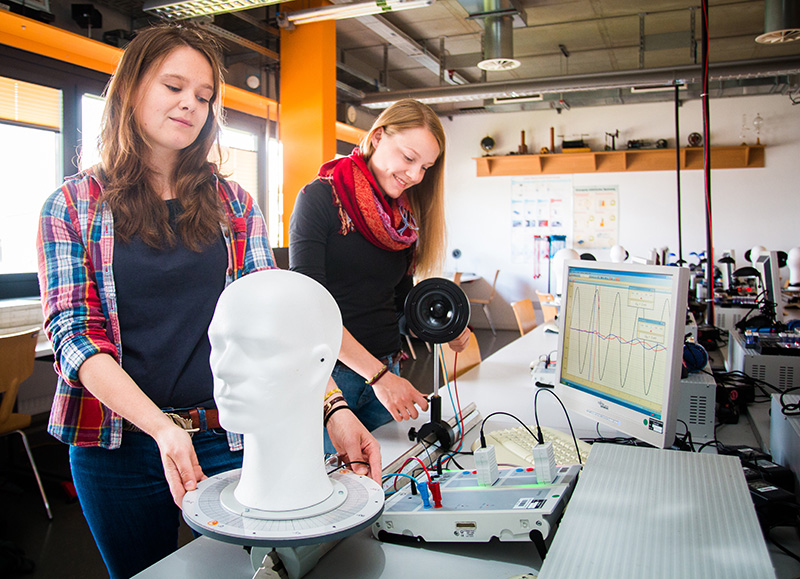Learning in Pairs Is Simply Better
Two friends, Anna Dietze and Marike-Christiane Maack, study the Bachelor in Sensors & Cognitive Psychology and organize their everyday university life together
-

The students Marike-Christiane Maack (l.) and Anna Dietze carry out an experiment on human listening behavior in a laboratory of the Institute of Physics at the TU Chemnitz. Photo: Steve Conrad
Anna Dietze and Marike-Christiane Maack are best friends. They met a year and a half ago during the Orientation Week of the Student Representatives in Physics at the Technische Universität Chemnitz and have been inseparable ever since. Both left their homes in West Germany and moved to Chemnitz in Saxony to study Sensors & Cognitive Psychology. Anna Dietze was born in Baden-Württemberg and experiences her relocation as a welcome challenge. “After my high school graduation, I went on a half year Work & Travel trip to Australia. Therefore, I’m used to being far away from my parents’ home and it doesn’t bother me too much. When I was searching for a study place, the exact location was therefore of secondary importance to me. The most important thing for me was a modern and technically equipped university. In this case, I have made a very good choice with the TU Chemnitz, especially since the East is generally in an upswing too“, explains the 21-year-old. For Marike-Christiane Maack, who grew up in a small town in Schleswig-Holstein, the key factor was the cultural flair of the city of Chemnitz. “Art and culture are very important to me“, says the student and she adds: “With its numerous museums, theaters and galleries Chemnitz has a lot to offer in this respect. At the same time, the closeness to the large Saxon cities of Leipzig and Dresden is really nice.“
Initially, the two young women were interested in studying purely Psychology, but the interdisciplinary nature of the program in Sensors & Cognitive Psychology through the technical combination of Psychology and Physics with influences from Engineering, Computer Science and Medicine convinced the high school graduates in the end. This study program is unique in Germany. Students are trained to take a holistic view of issues relating to all of the senses in the context of innovative product developments and secure systems. Furthermore, the six-semester Bachelor’s program imparts a sound knowledge of sensory and cognitive processes, as well as the ability to combine this knowledge with a basic understanding of technological and technical procedures and processes. The 22-year-old Maack finds the future-oriented approach of the subject to be very valuable and explains its practical applications: “Technology was understood differently in the past. Engineers built something and didn’t pay attention to possibilities for interaction with people. Today we are focusing on exactly this, because technical equipment takes over human tasks and protects people. In our studies we don’t learn how to build sensors, but we learn what is physically possible and what the sensors need to be able to do in order to optimally operate in human-machine interactions. After our graduation, we will represent the connection between the technician and the human senses.“
Dietze has also discussed innovative workplace design and the use of sensors in age-appropriate systems with her fellow students during a seminar on the optional subject of Ergonomics. How do colors and shapes promote creativity in teams? Which sensory perceptions influence decisions the most? How can sensors be optimally integrated into age-appropriate living spaces in order to ensure safety? Using empirical-experimental studies, students receive comprehensive insight into the qualitative research. “In each subject, we learn to think about everything critically. Our professors place a great emphasis on methodology and practical application. Among other things, we learn how to measure the skin conductance, hearing function and heart rate variability of people“, said the student. “The casual relationships among students and professors are also great, as well as good supervision and support. You can be sure that every professor has an open ear and is prepared to help in case of questions or uncertainty.“
And if a question should remain unanswered, her best friend is there for support. From day one, the students have made their way through their studies together – they attend the same courses, study together for exams and motivate each other. “Anna is the reason why I felt comfortable here right away. She makes Chemnitz my home“, explains Maack. After completing the Bachelor’s program, both want to continue studying for a Master’s degree, and gladly together. However, they don’t yet know where they want to go later in their professional lives. One thing is certain for Dietze: “We will help to create technology in such a way that it represents the greatest possible value for people.“
(Author: Katharina Preuß,Translation: Nataliia Boiko and Sarah Wilson)
Katharina Thehos
06.08.2015




